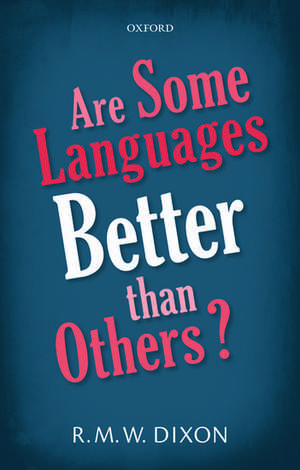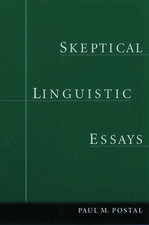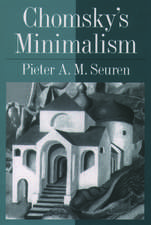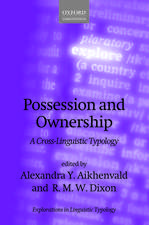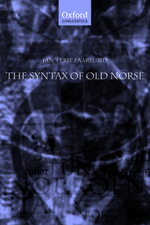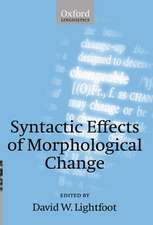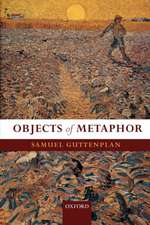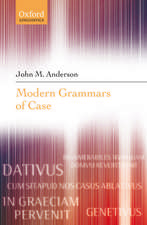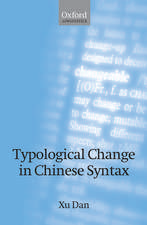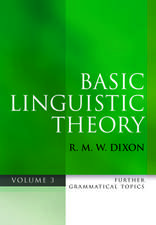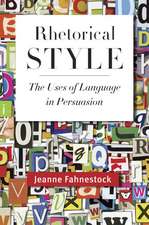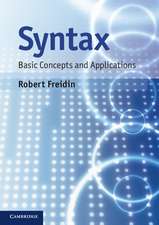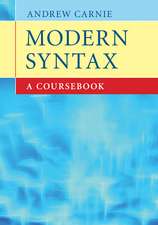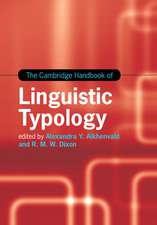Are Some Languages Better than Others?
Autor R. M. W. Dixonen Limba Engleză Hardback – 24 mar 2016
| Toate formatele și edițiile | Preț | Express |
|---|---|---|
| Paperback (1) | 169.45 lei 10-16 zile | |
| OUP OXFORD – 14 dec 2017 | 169.45 lei 10-16 zile | |
| Hardback (1) | 277.99 lei 31-37 zile | |
| OUP OXFORD – 24 mar 2016 | 277.99 lei 31-37 zile |
Preț: 277.99 lei
Preț vechi: 292.59 lei
-5% Nou
Puncte Express: 417
Preț estimativ în valută:
53.19€ • 55.65$ • 44.19£
53.19€ • 55.65$ • 44.19£
Carte tipărită la comandă
Livrare economică 22-28 martie
Preluare comenzi: 021 569.72.76
Specificații
ISBN-13: 9780198766810
ISBN-10: 0198766815
Pagini: 288
Dimensiuni: 144 x 222 x 22 mm
Greutate: 0.46 kg
Editura: OUP OXFORD
Colecția OUP Oxford
Locul publicării:Oxford, United Kingdom
ISBN-10: 0198766815
Pagini: 288
Dimensiuni: 144 x 222 x 22 mm
Greutate: 0.46 kg
Editura: OUP OXFORD
Colecția OUP Oxford
Locul publicării:Oxford, United Kingdom
Recenzii
A veritable compendium of linguistics, a collection of concise but detailed information about the essential components of human languages. It is written in an accessible, enjoyable, and refreshingly clear style. It also brings many other important questions into focus, for example, the varying extents to which speakers of diverse tongues make use of the vast potential resources of human language.
Too many linguists are afraid to pose the question that makes up the title of this book. Like people, languages are different, and each has its own strengths and weaknesses; some are harder to figure out, and some are relatively easy. Dixon illustrates these facts in a very clear and engaging manner, using examples from a wide variety of languages from around the world, and though delightful anecdotes taken from his fifty years of experience in the field. This is a book based in linguistic reality, not linguistic theory.
The (in)equality of languages is certainly one of the most vexing issues in modern linguistics. This book effectively challenges some common views on language, ranging from those pertaining to feelings of western cultural superiority to the 'politically correct' convictions prevalent among traditional academic circles. The author offers a balanced and well-informed discussion of the issue and draws from a lifelong research experience with languages of all types, spoken in situations that can differ dramatically. A very refreshing approach that will keep the reader fascinated.
Too many linguists are afraid to pose the question that makes up the title of this book. Like people, languages are different, and each has its own strengths and weaknesses; some are harder to figure out, and some are relatively easy. Dixon illustrates these facts in a very clear and engaging manner, using examples from a wide variety of languages from around the world, and though delightful anecdotes taken from his fifty years of experience in the field. This is a book based in linguistic reality, not linguistic theory.
The (in)equality of languages is certainly one of the most vexing issues in modern linguistics. This book effectively challenges some common views on language, ranging from those pertaining to feelings of western cultural superiority to the 'politically correct' convictions prevalent among traditional academic circles. The author offers a balanced and well-informed discussion of the issue and draws from a lifelong research experience with languages of all types, spoken in situations that can differ dramatically. A very refreshing approach that will keep the reader fascinated.
Notă biografică
R. M. W. Dixon is Adjunct Professor and Deputy Director of the Language and Culture Research Centre at James Cook University. He has written extensively on a number of Australian and Amazonian languages, as well as on ergativity, semantics, and English grammar. His many books include The Rise and Fall of Languages (CUP 1997), Basic Linguistic Theory (OUP 2010-2), Making New Words (OUP 2014), and Edible Gender, Mother-in-Law Style, and Other Grammatical Wonders (OUP 2015). Dixon's academic biography I am a Linguist was published by Brill in 2011.
